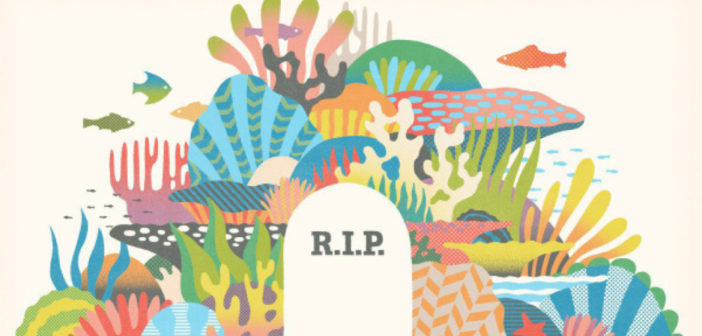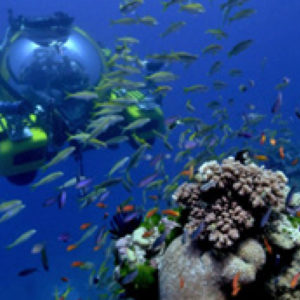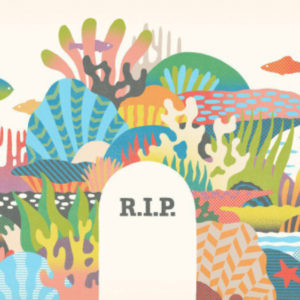By: Michayne Stoney
On Oct. 12, Outside Magazine tweeted the link to an article, along with an obituary for the Great Barrier Reef.
“The Great Barrier Reef of Australia passed away in 2016 after a long illness. It was 25 million years old,” reported Outside Magazine.
This article stated the reefs’ lifespan was from 25 million BC-2016. Undoubtedly, this generated waves of shock and disbelief throughout social media.
“Twitter users have been grieving the loss of the reef and urging followers to pay serious attention to the consequences,” according to CNN.
However, the reports claiming the reefs are dead are said to be a major exaggeration. Scientifically, the reefs, are dying, but not yet completely dead.
“While we should be very concerned about the condition of the reef, to state that the reef is ‘officially dead’, is an unfortunate example of sensationalist journalism,” said Dr. William Ellis, a Saint Leo professor of biology and a marine biologist. “The majority of the coral is still alive, but the stresses of elevated temperatures and increased ocean acidity are a serious threat to the surviving corals.”
The Great Barrier Reef, located in Queensland, Australia, is the world’s largest coral reef system. According to the Great Barrier Reef Travel Guide, it has over 2,900 individual reefs, and stretches over 1,400 miles. It contains a wide variety of aquatic life and coral cays, and According to the Australian Government-Department of the Environment and Energy, the reefs provide a beautiful, picturesque depiction of tropical beaches.
“The GBR is of superlative natural beauty above and below the water, and provides some of the most spectacular scenery on earth. It is one of a few living structures visible from space, appearing as a complex string of reefal structures along Australia’s northeast coast,” said Australian Government-Department of the Environment and Energy.
Also, in 1981, the Great Barrier Reef was selected as a World Heritage site, and CNN branded it as one of the seven natural wonders of the world. In CNN’s Destinations interactive, the reef is described as, “Home to the current generations of polyps that is also inhabited by many colorful and exotic species of marine life. Nearly microscopic fish co-exist with much larger whale sharks, countless shellfish and other fanciful creatures.”
“Many animals rely on the corals for refuge and food. While some of these reef dwelling species will adapt to the reduction/loss of corals, it is certain that many will not,” said Dr. Ellis.
Unfortunately, in recent times, many storms have affected the reefs negatively. Also, The Great Barrier Outlook Relief report from 2014 noted the reef was under severe threat from climate change, poor water quality from land-based run-off, impacts of coastal development, and illegal fishing.
“The harsh influence of man combined with various cyclical and natural factors have created cause for concern amongst both biologists and conservationist groups who do not want to see this precious natural miracle fall into decline. One of the contributing factors to the reef’s beauty which is simultaneously one of its greatest weaknesses to threats is the level of utter dependence each part of the ecosystem has on one another,” states thegreatbarrierreef.com.
Earlier this month, the Great Barrier Reef was given a D for its overall health report by the federal and Queensland government.
“The results of the annual report card were based on data collected before this year’s climate change-induced bleaching event that killed about a fifth of the reef’s coral, suggesting next year’s results will be even worse,” states an article by the Guardian published on October 22. “The report card measures the progress towards water pollution targets, as well as the overall health of the Great Barrier Reef’s ecosystems, including coral and seagrass.”
Although much was put in place by government officials, the reefs seemed to not have made the turn around everyone had anticipated.
“The government has a target to reduce inorganic nitrogen flowing into the Great Barrier Reef – mostly from sugar-cane fertilization – by 50%. The report card rated progress towards that target with an E or “very poor”, finding it had only been reduced by 18.1%,” reports The Guardian.
Because of its beauty and ecological importance, efforts are still being made to combat the harmful effects of coral bleaching, overfishing, pollution, and storms. There is still much hope and desire to salvage the reefs, and save them from dying completely.
“Bleaching events and subsequent recoveries have happened many times in the past. However, full recovery would require that we fix what is causing the bleaching in the first place. I’m not certain that will happen,” said Dr. Ellis. “Although industry in Australia, particularly the mining industry, has a role to play in the degradation of the reef, the causes of this bleaching are mostly global in their scale. For this reason, the solutions to the problem must also be global.”
Also, ABC News reports, “Thousands of so-called citizen scientists are putting up their hands to help professional scientists working to measure the impact on the Great Barrier Reef in the aftermath of this year’s catastrophic coral bleaching.”
Members of the public are trying to help out in whatever way they can. Much efforts are being made to keep a record of the amount of fish, and capture images of the reefs, in order to gather information, and send them to the relative authorities. In an interview with ABC News, Sabine Zonderland spoke about working with teammates to count aquatic species.
“I saw lots of trout, lots of little Nemo fish, they were all together in little families so we saw lots of them. I think it’s fantastic we can get involved even though we’re not marine scientists or have any biology background. That’s wonderful to know you can give back,” said Zonderland.
With such help from members of the public, hope is being generated that the Great Barrier Reefs will not succumb to the harsh environmental climate. The Great Barrier Reefs are of significant value where ecology and tourism are concerned.
“If people hear that the reef is dead, most will not choose to visit the area. This has been a great concern for the Australian government,” said Dr. William Ellis.








1 Comment
Top site ,.. amazaing post ! Just keep the work on !